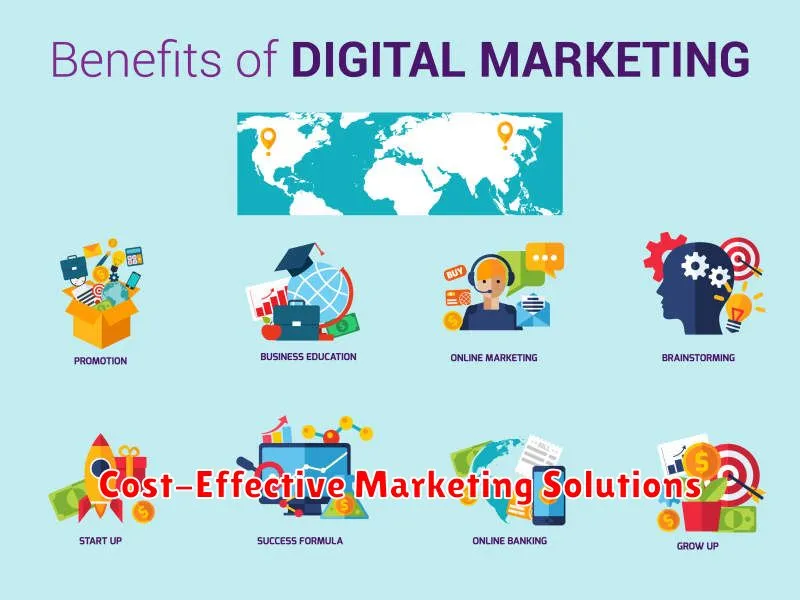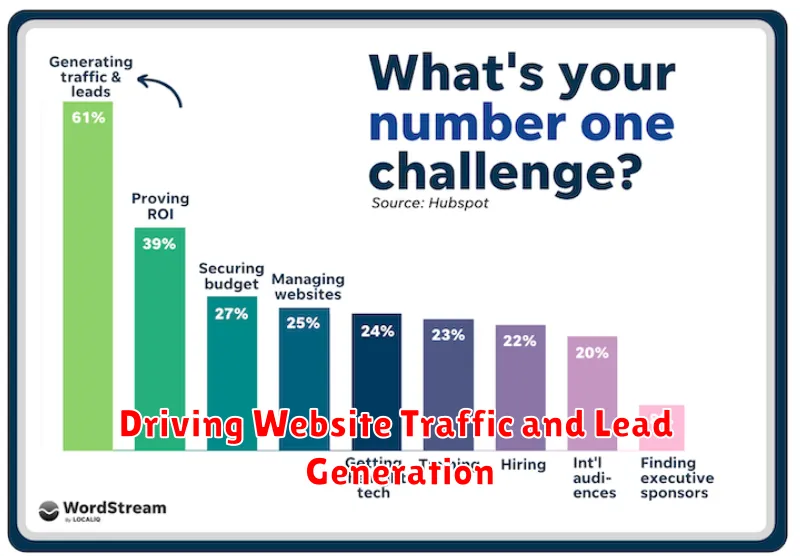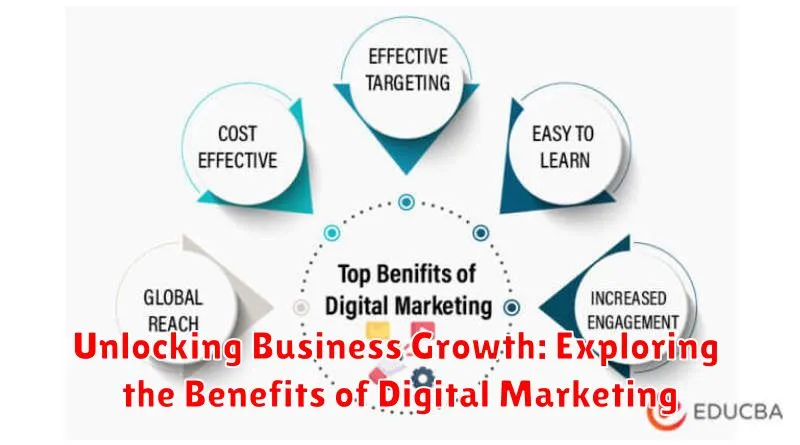In today’s rapidly evolving digital landscape, businesses face unprecedented challenges and opportunities. Digital marketing has emerged as a powerful tool for business growth, offering a myriad of benefits for organizations of all sizes. This article will delve into the core advantages of incorporating digital marketing strategies into your business model, exploring how they can unlock potential, expand reach, and ultimately drive significant growth. From enhancing brand visibility and engaging target audiences to generating leads and increasing sales, the transformative power of digital marketing is undeniable.
Unlocking business growth requires a strategic approach, and digital marketing provides the necessary framework for success. By leveraging various online channels and platforms, businesses can connect with their target customers in a more meaningful and effective way. This article will examine the key components of a successful digital marketing strategy, including search engine optimization (SEO), social media marketing, content marketing, and email marketing. Understanding how these elements work together is crucial for maximizing your return on investment (ROI) and achieving sustainable business growth in the digital age.
Understanding the Core Benefits of Digital Marketing
In today’s interconnected world, digital marketing has become essential for business growth. It offers a range of advantages that traditional marketing methods struggle to match. This section will explore the core benefits, providing a foundation for understanding its transformative power.
Digital marketing empowers businesses to connect with their target audience where they spend a significant portion of their time: online. This includes search engines, social media platforms, email, and websites. By leveraging these channels, businesses can expand their reach and build meaningful connections with potential customers.
Measurable results are a key benefit of digital marketing. Unlike traditional methods, digital campaigns provide concrete data and analytics, allowing businesses to track performance, understand what works, and refine their strategies for optimal results. This data-driven approach ensures efficient use of resources and maximizes return on investment.
Increased Brand Visibility and Reach
In today’s digital age, a strong online presence is crucial for business success. Digital marketing offers unparalleled opportunities to expand brand visibility and reach a wider audience than traditional methods. By leveraging various online channels, businesses can connect with potential customers where they spend a significant portion of their time – online.
Search engine optimization (SEO) plays a vital role in enhancing online visibility. By optimizing website content and employing effective SEO strategies, businesses can improve their search engine rankings. Higher rankings translate to increased organic traffic and greater brand exposure to users actively searching for relevant products or services.
Social media marketing further amplifies brand reach. Platforms like Facebook, Instagram, and Twitter provide avenues to connect with target audiences, build brand communities, and share engaging content. This expanded reach fosters brand awareness and creates opportunities for increased customer engagement.
Targeted Audience Engagement and Conversions
Digital marketing offers unparalleled opportunities to connect with specific demographics, interests, and behaviors. Unlike traditional marketing methods, digital channels allow for precise targeting, ensuring your message reaches the most relevant audience. This focused approach maximizes the impact of your campaigns and drives meaningful engagement.
Through various digital platforms, businesses can segment their audience based on factors like age, location, online activity, and purchase history. This allows for personalized content delivery, creating a more resonant experience for potential customers. Personalized experiences cultivate stronger connections and increase the likelihood of conversions, driving sales, lead generation, and brand loyalty.
Tools like social media advertising and search engine marketing empower businesses to reach their ideal customers at the right time and place. This strategic targeting significantly boosts the effectiveness of marketing efforts, resulting in higher conversion rates and a greater return on investment.
Cost-Effective Marketing Solutions

Traditional marketing methods often involve substantial upfront investments and recurring costs. Digital marketing offers a more budget-friendly approach, allowing businesses to tailor their spending to specific campaigns and strategies.
Pay-per-click (PPC) advertising, for instance, allows businesses to pay only when a user clicks on their ad. This eliminates wasted ad spend on uninterested audiences. Social media marketing can be highly effective with organic content strategies, requiring minimal financial investment while still reaching a large audience. Email marketing, too, offers a high return on investment by nurturing leads and driving conversions at a relatively low cost.
Furthermore, digital marketing provides businesses with greater control and flexibility over their budgets. Campaigns can be easily scaled up or down based on performance and budget constraints. This agility allows for optimal resource allocation and maximizes the impact of every marketing dollar spent. This inherent cost-effectiveness makes digital marketing an attractive option for businesses of all sizes, from startups to established enterprises.
Data-Driven Insights and Analytics
One of the most significant advantages of digital marketing lies in its capacity to provide measurable and actionable data.
Unlike traditional marketing methods, digital campaigns offer real-time tracking and analysis of key performance indicators (KPIs). This data provides invaluable insights into consumer behavior, campaign effectiveness, and return on investment (ROI).
By leveraging analytics platforms, businesses can monitor website traffic, track conversions, analyze customer demographics, and understand engagement patterns. These insights empower businesses to refine their strategies, optimize campaigns, and personalize the customer experience, ultimately maximizing their marketing impact.
Through A/B testing, marketers can experiment with different versions of ad copy, landing pages, and calls to action to identify what resonates best with their target audience. This iterative approach allows for continuous optimization and ensures that marketing efforts are always aligned with business objectives.
Data-driven decision-making eliminates guesswork and allows for strategic allocation of resources, resulting in more efficient and profitable marketing campaigns.
Enhanced Customer Relationship Management
Digital marketing offers powerful tools for nurturing and enhancing customer relationships. Personalized communication is key. Through email marketing, targeted advertising, and social media engagement, businesses can tailor their messages to resonate with individual customer preferences and needs.
Data analytics plays a vital role. By tracking customer interactions across various digital platforms, businesses gain valuable insights into customer behavior, purchase history, and preferences. This data enables businesses to segment their audience effectively and deliver highly relevant content and offers.
Automated marketing platforms streamline customer relationship management processes. These platforms enable businesses to schedule personalized emails, track customer interactions, and manage social media engagement efficiently, leading to improved customer satisfaction and retention.
Building a Strong Online Presence
In today’s digital age, a robust online presence is essential for business growth. It’s more than just having a website; it’s about creating a cohesive and engaging brand experience across multiple digital touchpoints.
A strong online presence starts with a professional website that is easy to navigate, mobile-friendly, and reflects your brand identity. This digital storefront serves as the central hub for all your online activities.
Social media platforms play a vital role in building brand awareness and engaging with your target audience. Choosing the right platforms and consistently delivering valuable content are crucial for success.
Beyond websites and social media, consider leveraging other online channels like online directories and review sites to enhance visibility and build trust.
Driving Website Traffic and Lead Generation

Digital marketing offers a powerful toolkit for driving targeted traffic to your website and generating valuable leads. Search Engine Optimization (SEO) enhances your website’s visibility in search engine results pages (SERPs), attracting organic traffic from users actively searching for products or services like yours. By optimizing website content with relevant keywords and building high-quality backlinks, businesses can improve their search engine rankings and attract a steady stream of potential customers.
Pay-Per-Click (PPC) advertising complements SEO by allowing businesses to bid on relevant keywords and display ads at the top of search results. This targeted approach ensures that your ads are seen by users who are actively searching for specific products or services, maximizing the chances of attracting qualified leads. Furthermore, social media marketing campaigns can be highly effective in driving traffic and generating leads by engaging with target audiences on platforms where they spend their time.
Staying Ahead of the Competition
In today’s dynamic market, staying ahead of the competition is crucial for sustained success. Digital marketing provides the tools and strategies necessary to achieve this. Competitive analysis, enabled by digital platforms, offers valuable insights into competitor activities, market trends, and customer preferences. This data empowers businesses to refine their strategies, identify opportunities, and differentiate their offerings effectively.
Digital marketing allows businesses to adapt quickly to market changes. The flexibility and real-time data analysis capabilities of digital campaigns enable businesses to pivot their strategies as needed, ensuring they remain relevant and competitive. This agility is essential in a rapidly evolving business landscape.
Furthermore, digital marketing fosters innovation. By constantly experimenting with new platforms, technologies, and content formats, businesses can discover unique approaches to engage their target audience and stay ahead of the curve. This constant drive for innovation can be a key differentiator in a crowded market.

